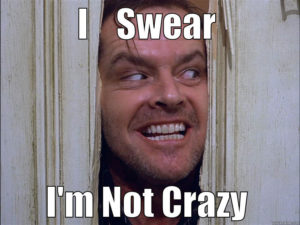Have you ever considered or thought about what it would be like to go to counseling? Or maybe you have even given some thought as to how counseling should be? In our society, we tend to have some pretty big misconceptions about going to counseling. In other words, there is a huge stigma in mental health that sometimes, as a therapist, is hard to overcome with getting my clients to understand that therapy can be a very rewarding and enriched process to their personal growth.
What is it that you should know?
So, you are probably asking yourself by now, what is it that he wants us to know! If you are already in counseling or curious about seeking counseling or just plain curious,these five things listed below will come in very handy!
THE LOWDOWN:
You don’t have to be diagnosed with a mental illness to go to counseling. This alone, is one of the biggest misconceptions about coming to therapy. You aren’t crazy if you come to therapy. Yes, people with serious mental illness seek therapy. However, so do individuals who want to seek growth or are just wanting some more clarity on whatever they maybe experiencing in their lives.

It’s not a therapist’s job to give you advice. I get clients all of the time that are asking me what they should do about this or that. I tell them that I am not here to give them advice because if I do they are letting me take their power away from them. You don’t want to give away your power to make your own decisions especially if it is bad advice. With this being said, however, I will process with you and assist you in gaining clarity to help you make the best decision (for you) of whatever it is that you are having difficulties with.
Just going to counseling won’t necessarily help-you have to participate! Too many times clients put the responsibility on the therapist to ask questions and do most of the talking. Participation is necessary. If you are wanting to receive the benefits of coming to counseling then it is encouraged that you participate and be a part of what it is that you are seeking to change. After all, it is your time and money so it is important to get out of it what it is that you are seeking.
Counseling doesn’t have to be a long term commitment. A lot of people do not seek counseling due to the misconceptions that they cannot afford it or that they have to be locked in for a long-term commitment. This is not true. You can come as long as you like or a short as you like. I have clients that come one time or some that come weekly. It is certainly up to you how long you want to come or not come. Any therapist that tells you that you have to come a certain amount time is misleading and in my opinion, unethical.
The right “fit” is the most important factor when finding a therapist. This, by far, is the most important factor when considering a therapist. There are many great therapists out there and they are great at what they do. However, what may be a great therapist for one may not be for another. I encourage you to find the best “fit” for yourself within the context of what it is that you are trying to accomplish in counseling.
Speaking of right fit…

So, there you have it! The five top things that this therapist wants you to know! If you are thinking about going to counseling or are already in counseling these five things may very well be beneficial for you to know on your journey towards personal growth.

Such simple facts and seemingly obvious but apparently they’re not. Participation and the finding the right fit are paramount to achieving any success during the counseling process. Many people are looking for advice during the counseling process and it’s not about getting advice, it’s about finding better ways to achieve your goals or overcome negative behaviour and this is exactly what counselors are trained for. Great little article. Short and direct. Thanks.
I have been referred to a mental health professional for Bipolar II, PTSD, OCD (times, dates, deadlines, etc) and Depression (fantastic mix, right?), but the therapist I started with isn’t covered by my insurance, so I’ve gone untreated (besides meds) for years because of the expense… and also because the one and only therapist I’ve ever seen to help me heal from these issues (or cope with them more effectively) made me feel much worse than when I started (and I was suicidal when I sought help in the first place). When coupled with the expense, I just couldn’t continue with that particular therapist and am scared to pieces to seek therapy again, even though my regular doctor has a referral ready to go for me. Can you suggest a way that I (or others in a similar situation) can alleviate this fear and find a workable solution?
Thanks donna for such a candid and authentic post. I get that a lot of time with clients who have had bad experiences with a therapist and no longer want to do therapy because of it. Those fears are very real and I totally understand why you and others may have them. First and foremost being aware of that fear and knowing that it is probably one of the first sources of resistance to therapy puts you ahead of the eight ball so to speak. I would encourage you to give that aspect of “fear” a voice and ask yourself, “if that fear could talk to me what would it say?” Sometimes giving it a voice can really move us towards a better understanding of how that feeling we are experiencing prevents us from moving towards the life that we deserve to live. It may not be the cure all. however, I believe that it is a techniques that assists us in moving in the right direction.